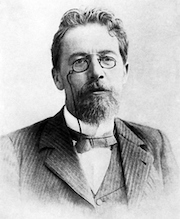I’ve been skimming through a complete collection of Chekhov’s stories. There’s lotsa chaff—small anecdotes published in newspapers from early days that don’t do much and weren’t intended for the ages. But then you come upon “an unpleasantness,” a long story from a later period that stands up like an erection.

It’s about a doctor who runs a ward in a filthy country hospital. He can’t stand the gross incompetence of the staff that surrounds him, especially his loutish medical assistant, a conniving drunkard. When the assistant turns up for the umpteenth time with a hangover late for morning rounds, the doctor is driven to the breaking point and punches him in the nose, knocking him down in front of the nurses and all the patients in the ward—it’s the first time in his life he has ever struck anyone.

Feeling humiliated, he decides to resign from the hospital. His humiliation is amplified when the incident comes to the attention of the corrupt bureaucrats who run the place. In the end he is caught in a swamp of conflicted feelings, and he doesn’t resign. The complications of the doctor’s psychology are at the heart of the story, which seems to hit so close to home you’d think the incident was autobiographical. But it likely isn’t. I doubt that Chekhov, himself a country doctor, would have been bothered had he kicked the assistant’s ass.
